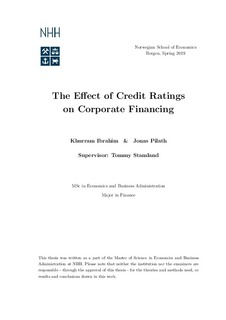The effect of credit ratings on corporate financing
Master thesis
Permanent lenke
http://hdl.handle.net/11250/2612213Utgivelsesdato
2019Metadata
Vis full innførselSamlinger
- Master Thesis [4372]
Sammendrag
In this analysis, we test for potential causal e ects of credit ratings on corporate nancing
behavior. We start by replicating the analysis of Kisgen (2006). Like him, we nd
signi cantly negative e ects on debt nancing for rms that are close to moving to another
macro-rating. We are however not able to replicate his ndings that also within a micro-
rating, rms that are closer to being up- or downgraded are more prudent with regard to
debt nancing.
We then test for other elements that might in
uence the link between credit ratings and
corporate nancing. We nd that rms that have a large amount of debt maturing in the
near future issue less debt compared to equity than an average rm would do. This is
potentially in order to obtain better terms when the reissuance of the outstanding debt
takes place.
We also provide concrete estimates for the credit spread change of corporate debt after
up- or downgrades at di erent rating levels. We nd that rms who would face a stronger
credit spread change after an up- or downgrade are more prudent with debt issuance.
This e ect is even stronger if we multiply the potential credit spread change with the
total amount of debt outstanding. Even after controlling for the economic impact of a
credit rating change, we nd lower net debt issuance for rms close to moving to another
macro-rating. After controlling for overall di erent levels of debt nancing at di erent
credit ratings, only the border between BB and B remains to show such an abnormal
e ect on nancing.
In the last part of the analysis, we try to build a model which precisely values the cash
ows implied in a credit rating change. This model does however not lead to a higher
explanatory power, most likely due to unavailable data about rms' debt maturities after
a ve year horizon and the lack of an appropriate discount rate.
